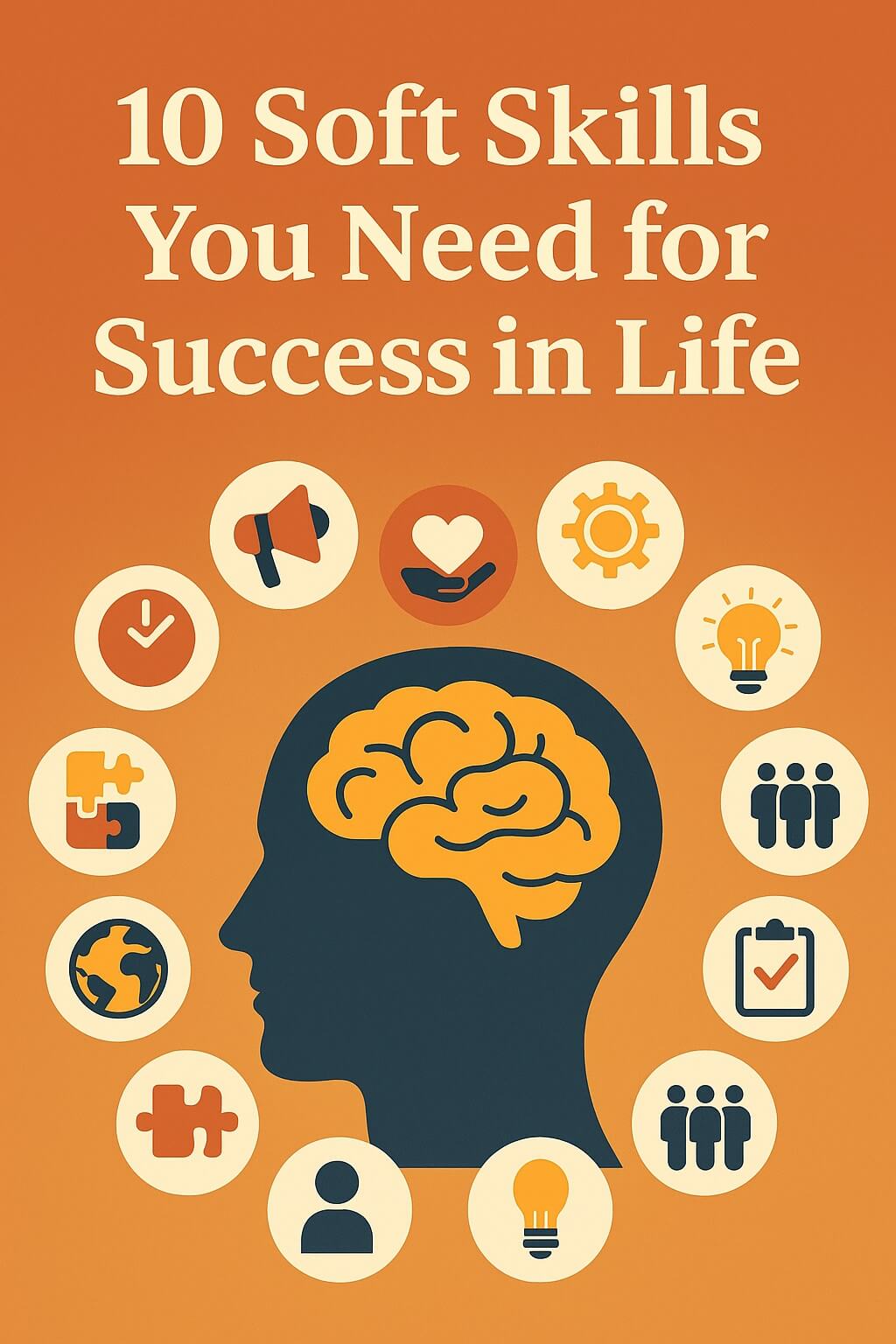
Success today isn’t defined solely by academic degrees or technical proficiency. It’s also about interacting, responding to change, and solving real-world problems. Studies show that 85% of career success comes from strong interpersonal skills, while only 15% relies on technical expertise.
As automation transforms industries, the ability to connect, empathize, and lead has never been more vital. This article outlines ten essential soft skills to elevate one's career and development.
Table of Content
- What Are Soft Skills?
- Why Soft Skills Matter More Than Ever
- 1. Effective Communication
- 2. Emotional Intelligence (EI)
- 3. Adaptability and Flexibility
- 4. Problem-Solving and Critical Thinking
- 5. Teamwork and Collaboration
- 6. Time Management
- 7. Leadership
- 8. Conflict Resolution
- 9. Cultural Competence and Diversity Awareness
- 10. Growth Mindset and Lifelong Learning
What Are Soft Skills?
Soft skills are non-technical abilities that reflect how you work, interact, and grow with others. These include communication, emotional intelligence, adaptability, and more.
Unlike job-specific hard skills, soft skills are transferable across every area of life—from the classroom to the workplace to your relationships.
Example: Coding is a hard skill, but teamwork is a soft skill. Both matter—but only one helps you thrive in any environment.
Why Soft Skills Matter More Than Ever
With routine tasks becoming automated, uniquely human skills are in high demand. According to the World Economic Forum, soft skills like emotional intelligence, creativity, and adaptability will top the most-needed skills.
A LinkedIn study also revealed that 92% of hiring managers prioritize candidates with strong soft skills over those with technical qualifications alone.
Top 10 Soft Skills You Need for Success

1. Effective Communication
Communication forms the foundation of every relationship, whether personal or professional. It's more than just talking; it’s about expressing ideas clearly, listening actively, and understanding nonverbal cues.
Key Components
-
Verbal: Speak with clarity and purpose.
-
Written: Keep messages concise and structured.
-
Non-verbal: Maintain eye contact, posture, and tone.
-
Active listening: Focus fully, ask clarifying questions, and summarize responses.
How to Improve
-
Join public speaking forums like Toastmasters.
-
Request feedback on your communication style.
-
Practice paraphrasing others’ ideas to show understanding.
2. Emotional Intelligence (EI)
Emotional intelligence is your ability to recognize, manage, and respond to emotions—both your own and others’.
Core Elements
-
Self-awareness
-
Self-regulation
-
Empathy
-
Relationship management
Why It Matters
People with high EI often have stronger relationships and handle stress more effectively.
Growth Tips
-
Practice daily mindfulness.
-
Reflect on emotional triggers and responses.
-
Develop empathy by actively imagining other perspectives.
3. Adaptability and Flexibility
Change is constant. Your ability to adjust quickly and stay calm during uncertainty sets you apart in every setting.
Traits of Adaptable Individuals
-
Open to feedback and new ideas
-
Resilient under pressure
-
Willing to learn and unlearn
How to Build It
-
Take on unfamiliar tasks.
-
View challenges as opportunities to grow.
-
Create contingency plans for high-risk scenarios.
4. Problem-Solving and Critical Thinking
Solving problems effectively requires a balance of logic, creativity, and decision-making.
Step-by-Step Approach
-
Clearly define the issue.
-
Gather data and analyze causes.
-
Brainstorm potential solutions.
-
Choose and implement the best one.
-
Evaluate the outcome.
Practical Tips
-
Challenge your assumptions.
-
Use models like SWOT or 5 Whys for deeper insights.
-
Break big problems into smaller, manageable steps.
5. Teamwork and Collaboration
No one achieves success alone. Teamwork is about working cooperatively with others to accomplish a shared goal.
What It Looks Like
-
Building trust and mutual respect
-
Taking accountability
-
Engaging in constructive feedback
-
Managing conflict without escalating tensions
How to Strengthen Teamwork
-
Clarify individual roles in team settings.
-
Encourage open dialogue and brainstorming.
-
Celebrate team wins, not just individual achievements.
6. Time Management
Effective time management helps you maintain productivity, reduce stress, and strike a healthy balance.
Best Practices
-
Use the Eisenhower Matrix to prioritize tasks.
-
Work in focused time blocks (e.g., Pomodoro Technique).
-
Minimize distractions and avoid multitasking.
7. Leadership
Leadership isn’t reserved for managers. It’s about guiding, motivating, and empowering others—even without a title.
Traits of Strong Leaders
-
Clear vision and strategic thinking
-
Accountability and integrity
-
Decision-making under pressure
How to Develop Leadership
-
Volunteer for leadership roles in group projects.
-
Study biographies of great leaders.
-
Seek regular feedback and mentorship.
8. Conflict Resolution
Conflict is inevitable. But how you handle it determines the outcome—growth or tension.
Resolution Strategies
-
Focus on interests, not personal attacks.
-
Use “I” statements to express concerns.
-
Collaborate to find win-win outcomes.
-
Stay calm and solution-focused.
9. Cultural Competence and Diversity Awareness
In an increasingly globalized world, understanding and respecting cultural differences is non-negotiable.
Why It Matters
Diverse teams are more innovative and resilient. Awareness prevents bias and fosters inclusion.
Ways to Improve
-
Learn about different customs and communication norms.
-
Reflect on your own biases.
-
Adjust your communication style to suit diverse audiences.
10. Growth Mindset and Lifelong Learning
Coined by psychologist Carol Dweck, a growth mindset is the belief that abilities can be developed through dedication.
Why It’s a Game Changer
People with growth mindsets are more resilient, adaptable, and open to feedback.
Cultivation Techniques
-
Embrace challenges instead of avoiding them.
-
Reflect on failures as learning moments.
-
Set learning goals, not just performance goals.
Conclusion
Mastering soft skills is no longer optional—it’s essential. These ten abilities will help you build stronger relationships, excel in your career, and adapt to whatever life throws your way.
By investing time and energy into developing them, you'll not only future-proof your career but also enrich your personal growth and empower those around you.
FAQs
1. How can I identify which soft skills I need to improve?
Start by reflecting on your daily interactions. Seek honest feedback from peers, mentors, or use self-assessment tools.
2. Are soft skills more important than technical skills?
Both matter. However, soft skills often determine how well you apply your technical knowledge in real-world scenarios.
3. Can soft skills be learned or are they innate?
They can be learned through practice, feedback, and real-world application.
4. What resources can help me develop soft skills?
Books like Emotional Intelligence by Daniel Goleman, leadership workshops, online courses (e.g., Coursera, LinkedIn Learning), and mentorship programs.
5. How do I showcase soft skills in job interviews?
Use the STAR method—share specific Situations, Tasks, Actions, and Results to illustrate your soft skill strengths.
Soft Skills




